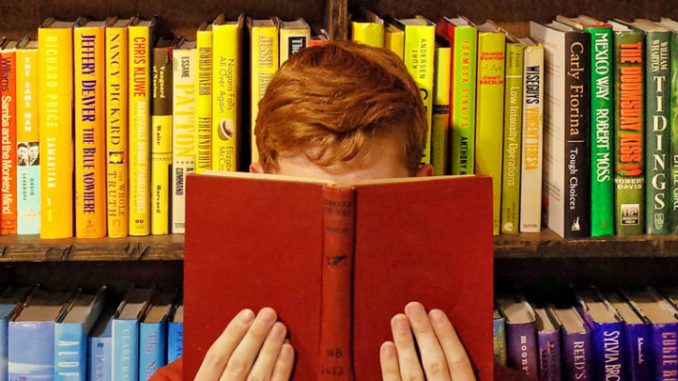
Angelina Beltrani, Managing Editor |
How many books did you read last year, from cover to cover, for your own personal leisure. Your answer may be high if you’re an avid reader, but I’m guessing for most, you may not have even hit double digits. According to the American Time Use Survey, reading is declining among the American public with the percentage of readers in 2003 at 26.3 percent dropping to 19.5 percent in 2016. Another study conducted in 2019 states that Americans from ages 20 to 34 spend less than seven minutes a day reading. Should these figures be concerning to us?
In short, yes. We should be concerned. What does it say about us as a nation and as a generation? I think it is safe to say that it’s not something commendable. I want to preface this by saying I do not think literacy or critical thinking is declining. Reading looks a lot different in this modern era. Every time you look at your phone, it’s likely you’re reading something – a blog post, an Instagram caption or Twitter feed, an e-mail or a text. Students are also always reading.
Likely, students aren’t reading their textbooks from cover to cover but they are reading passages, notes and doing research for papers. But have we simply lost the attention span to sit down and enjoy novels because we are constantly multi-tasking in this digital age? Reading is becoming increasingly difficult with the growing abundance of streaming services competing for our attention and the glorification of binge-watching.
One might argue that reading is a pastime that simply isn’t as popular anymore, so what’s the harm in losing it? Well, there are many health advantages to reading. Reading exercises the brain by helping with memory function. It has been linked to slowing the effects of Alzheimer’s and dementia by contributing to stronger brain health in the elderly. Studies show that reading can increase a person’s tolerance for uncertainty.
In this particular study, the subjects who were avid readers were more likely to think creatively and accept multiple solutions to a problem. They did not need “cognitive closure,” a term which refers to the desire for easy solutions in making choices and a general distaste for vague ideas or confusion. Reading also builds a person’s vocabulary, which is linked to performing better on reading and comprehension exams. Plus, it is said to increase empathy in individuals and relieve stress.
Meanwhile, an alternative to reading is often the “easier” pastime of watching something on Netflix. While this kind of behavior can be stress-relieving , binge-watching, unlike reading, can have negative effects on an individual’s health. Binge-watching can lead to isolating behaviors, interfere with sleep patterns and binge-eating. It can also become an addiction in some cases. At the very least, watching television does not exercise the brain in the same way reading does.
So, now you know the benefits of reading and the drawbacks of opting for a Netflix binge session. I may have yet to convince you. So, I’ll end with this: Do you remember reading as a child? I know I do. I recall getting so excited for the Scholastic book fair to come to my school. I remember when I received the news that the Borders bookstore chain closed and how disappointed I felt.
I remember the feeling of getting so captivated by a book and its universe that I could not put it down – something akin to a binge session, only with words. I know I’m not the only one who loved reading as a child. What happened to us? Shouldn’t we care that we’ve lost something that once brought us joy? Have we really lost our passion for reading stories or are there simply too many distractions and simpler alternatives these days to focus long enough on what we used to treasure?

Leave a Reply